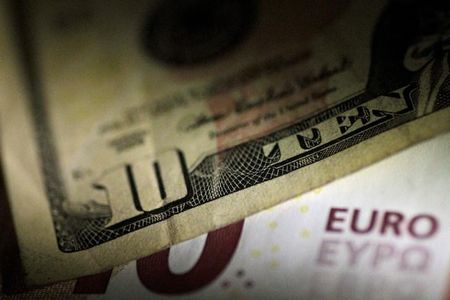
Investing.com – The US dollar retreated Monday, handing back some of its recent gains as Donald Trump’s pick for US Treasury Secretary appeared to reassure the bond market, while the euro rebounded from the two-year low seen last week.
At 05:05 ET (10:05 GMT), the Dollar Index, which tracks the greenback against a basket of six other currencies, traded 0.6% lower to 106.892, having hit a two-year peak on Friday.
Dollar slips after Trump nomination
President-elect Donald Trump nominated fund manager Scott Bessent to be his Treasury Secretary on Friday, and this has been welcomed by the bond market, with Treasury yields falling back.
However, Bessent has also been openly in favor of a strong dollar and has supported tariffs, suggesting any pullback in the currency might be short-lived.
“We are not sure whether the recent bullish flattening in the US Treasury curve represents the market seeing him as a ‘safe pair of hands’, but he certainly does not sound like someone who will be pushing President-elect Donald Trump into weak dollar policy,” said analysts at ING, in a note.
The main economic focus this week will be Wednesday’s Personal Consumption Expenditures Price index, the Federal Reserve’s preferred gauge of underlying inflation.
This “is expected at a little sticky 0.3% month-on-month and will keep the market guessing over whether the Fed will cut in December after all,” ING added.
Recent stubborn inflation data has seen the Fed take a cautious stance towards further interest rate cuts.
Euro rebounds from two-year low
In Europe, EUR/USD traded 0.6% higher to 1.0476, moving away from Friday’s two-year low of 1.0332 after European manufacturing surveys showed broad weakness last week, while the US surveys surprised on the high side.
This economic weakness has markets pricing in more aggressive easing from the European Central Bank.
“The view here remains there is no fiscal calvary coming in the eurozone and that the only way to address the current malaise is for the European Central Bank to cut rates more quickly than usual,” ING added.
The ECB has cut rates three times already this year but investors now see a 50% chance it will cut by 50 basis points on Dec. 12 instead of the usual 25 given weak growth and rising recession risks.
GBP/USD rose 0.4% to 1.2576, rebounding from hitting a six-week low on Friday after UK retail sales disappointed, leading the market to price in an increased chance of rate cuts from the Bank of England.
That said, Bank of England Deputy Governor Clare Lombardelli said on Monday she was more worried about the risk that inflation comes in higher – not lower – than the central bank has forecast.
“I view the probabilities of downside and upside risks to inflation as broadly balanced,” Lombardelli, making her first speech since joining the BoE in July.
“But at this point I am more worried about the possible consequences if the upside materialised, as this could require a more costly monetary policy response.”
Yen helped by drop in US yields
USD/JPY fell 0.2% to 154.41, after a 0.4% drop in the previous week. The currency pair tends to closely follow moves in Treasury yields, and had risen sharply in the past two months as the yen weakened.
“The Japanese yen is starting to show a little strength on the crosses. Helping that has been the shift in the fiscal-monetary policy mix,” ING added. “At the margin, Japanese fiscal stimulus is encouraging the view that the Bank of Japan will hike in December after all. Nearly 15bp of a 25bp hike is now priced.”
USD/CNY slipped slightly to 7.2447, after rising 0.2% last week.
This post is originally published on INVESTING.


